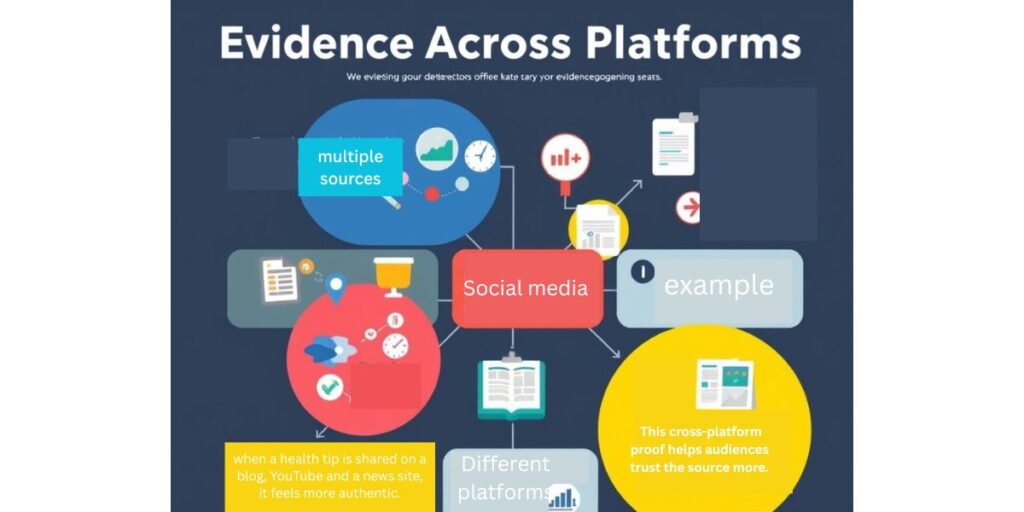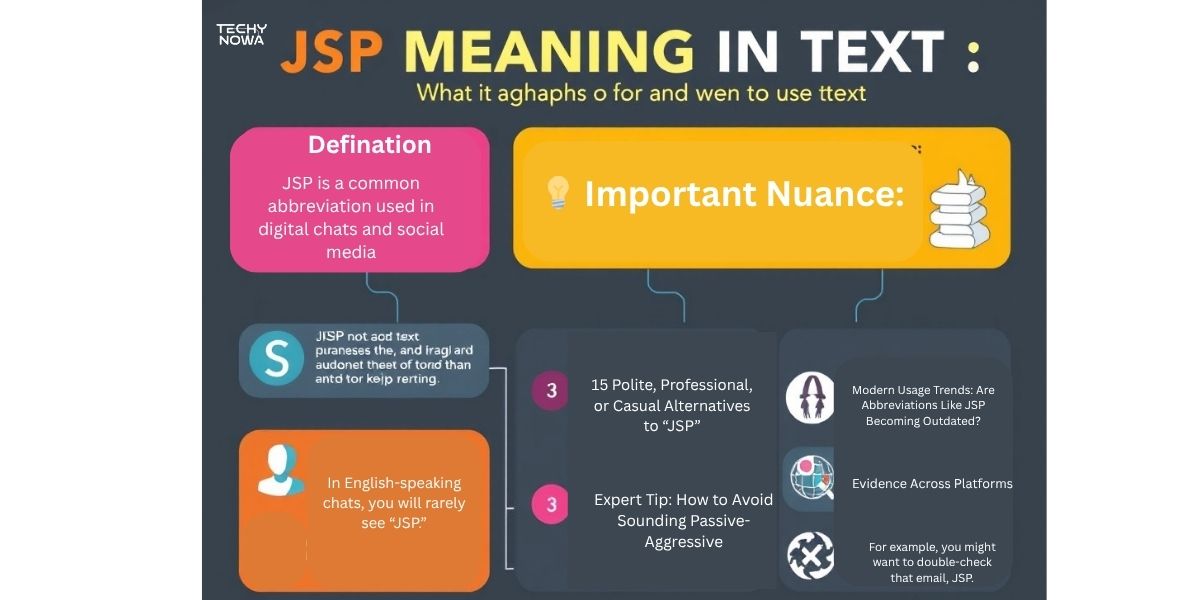JSP is a common abbreviation used in digital chats and social media. It often leaves people curious about what it truly means. In 2025, its usage has grown across texting platforms and online slang.
Understanding its meaning helps you communicate more clearly and confidently. This guide explains what JSP stands for and how to use it correctly. Let’s break down its real meaning and modern context in simple terms.
What Does JSP Mean in Text?
JSP in text usually stands for “Just Saying, Please.” It is a polite way to express an opinion or add a soft tone to a message. People use it to make their words sound less harsh or direct. It shows respect and thoughtfulness in communication. For example, you might want to double-check that email, JSP.
In casual chats, JSP helps make conversations smoother. It can turn a simple comment into a friendly suggestion. The phrase is often used in texting, social media or emails. It keeps the message light and polite. That is why many prefer adding JSP to maintain a positive tone.
Related guide: TM In Text Messages: Meaning, Usage, And Best Alternatives 2025
💡 Important Nuance:
- “JSP” meaning changes by context or language.
- Check tone and platform before using it.
- Wrong use can confuse others easily.
Is JSP Commonly Used?
It is not very common in English chats. It is more popular in French texting where it means “Je sais pas” or “I don’t know.” Many English users confuse it with other short forms. Its use depends on who you talk to and the platform you use. For example, French teens often text “JSP” instead of writing the full phrase.
In English-speaking chats, you will rarely see “JSP.” Most people prefer clear words like “IDK” or I don’t know. The term stays niche outside French circles. Some might use it jokingly or to copy internet trends. So, its popularity is limited and depends on the audience.
Related guide: EYP Meaning Slang: The Complete 2025 Guide To Its Usage, Definition & Alternatives
Why People Use JSP: Tone and Context
People use it in text to express humor or sarcasm. It often stands for Just Saying, Pal or Just Saying, Please. The tone depends on how it is used in a message. In friendly chats, it sounds light and playful. For example, You always take the last slice, JSP! feels teasing, not rude.
The same phrase can sound different in another context. If someone adds it after criticism, it might seem passive-aggressive. The tone becomes sharper and less friendly. That is why context is key when reading “JSP.” The meaning changes with emotion and situation.
Related guide: What Does RS Mean In Text? Complete Guide With Polite Alternatives 2025
When You Shouldn’t Use JSP
It is not the best choice for every project. You should not use it for large or complex web apps that need modern frameworks. It can be slow when handling heavy data or traffic. Debugging JSP pages is also harder compared to newer tools. For example, a real-time chat app would work better with Node.js than JSP.
You should also avoid it if you need quick development and flexibility. It requires more setup and maintenance than newer technologies. Frontend updates can be tricky and time-consuming. JSP also lacks strong community support today. So, it is better to use newer options like React or Angular for dynamic web projects.
15 Polite, Professional, or Casual Alternatives to “JSP”
There are many polite or casual alternatives to JSP. You can use HTML, PHP, or React depending on your project style. These options sound modern, simple and more flexible.
1. “Just a Thought”
A gentle way to share an idea without pressure.
Example: Just a thought, maybe we try a simpler design?
2. “No offense intended
Softens a comment that could sound harsh.
Example: No offense intended, but that color may be too bright.
3. “Only saying this because I care”
Shows kindness behind honest feedback.
Example: Only saying this because I care, you might need more rest.
4. “Hope you don’t mind me saying…”
Adds politeness before giving advice.
Example: Hope you do not mind me saying, your tone sounded sharp.
5. “Not trying to be rude, just being honest.”
Keeps honesty without sounding mean.
Example: Not trying to be rude, just being honest, the report needs edits.
6. “From a different perspective…”
Share another point of view calmly.
Example: From a different perspective, that plan could cost more.
7. “Take this with a grain of salt…”
Suggests your opinion is not absolute.
Example: Take this with a grain of salt, but I’d pick option B.
8. “Just bringing it up for consideration.”
Offer an idea without forcing it.
Example: Just bringing it up for consideration, maybe start earlier.
9. “Let me float an idea.”
Introducing a new suggestion softly.
Example: Let me float an idea, what if we change the format?
10. “No judgment at all.”
Ensures you are being understanding, not critical.
Example: No judgment at all, but you might try another method.
11. “Just chiming in.”
Add your opinion in a friendly, casual way.
Example: Just chiming in, I think the second option works better.
12. “It’s probably just me, but…”
Makes your opinion sound humble.
Example: “It is probably just me, but I prefer the older logo.
13. “You totally don’t have to agree, but…”
Gives room for others to differ.
Example: You totally do not have to agree, but that step feels unnecessary.
14. “Just for your consideration.”
Share an idea for others to think about.
Example: “Just for your consideration, we could shorten the meeting.
15. “Merely offering a suggestion.”
Keeps feedback polite and optional.
Example: Merely offering a suggestion, maybe add more visuals.
How to Choose the Best Alternative
Choosing the best alternative starts with knowing your needs clearly. Compare all options based on quality, cost and usefulness. Always check reviews or feedback before deciding. Think about long-term benefits, not just quick results. For example, when buying a phone, pick one that fits your budget and lasts longer.

Next, trust both research and intuition. Avoid rushing into choices without understanding the pros and cons. Ask for advice from someone with experience if needed. Keep your goals in mind while comparing each option. A thoughtful choice today can save you trouble tomorrow.
Expert Tip: How to Avoid Sounding Passive-Aggressive
It’s easy to sound passive-aggressive without meaning to. Words like whatever or fine can give off the wrong tone. Be clear and direct when sharing your thoughts. Use calm and respectful language instead of sarcasm. For example, say “I’d prefer if we try it this way” instead of “Sure, do it your way again.”
Stay aware of your tone and facial expressions when you speak. A neutral or kind tone helps your message sound genuine. Listen before reacting to others’ words. This keeps communication smooth and respectful. Over time, this habit builds trust and understanding in your conversations.
Modern Usage Trends: Are Abbreviations Like JSP Becoming Outdated?
| Aspect | Modern Trend | Explanation |
| Frequency of Use | Decreasing | Many people now prefer full words for clarity. |
| Digital Communication | Still Common | Abbreviations remain popular in texting and social media. |
| Professional Settings | Less Accepted | Full forms are used more in formal emails and work chats. |
| Younger Users | Mixed Use | Some still use abbreviations, while others favor emojis. |
| Overall Trend | Slowly Fading | Abbreviations like JSP are less trendy but not gone. |
Evidence Across Platforms
Evidence across platforms helps build trust and credibility. When information appears on different platforms, it shows consistency and reliability. Readers can verify facts easily from multiple sources. This makes the content more believable and professional. For example, when a health tip is shared on a blog, YouTube and a news site, it feels more authentic.

Different platforms offer unique ways to show evidence. Videos can show proof visually, while blogs can add references and data. Social media highlights public reactions and discussions. Together, they strengthen the overall message. This cross-platform proof helps audiences trust the source more.
My Real-Life Use of “JSP” in Chats & Messages
I first saw “JSP” in a friend’s group chat. At first, I did not know what it meant. Later, I learned it stood for Just Saying Please. I started using it when I wanted to sound polite but casual. It made my messages feel softer and friendlier.
Now I use it often in texts with friends. It helps me express requests without sounding demanding. It is a quick way to show respect in casual talks. My friends also started using it after seeing me. It keeps our conversations light and kind.
Frequently Asked Questions
What does “JSP” mean in text?
It stands for Just Saying Please, often used to sound polite in casual messages.
Is “JSP” a new slang term?
It is not new but has become popular again in 2025 as people use polite texting styles.
When should I use “JSP”?
Use “JSP” when making a request or suggestion politely in a casual conversation.
Can I use “JSP” in professional emails?
It is better for friendly chats. In formal writing, use full polite phrases instead.
Does “JSP” have other meanings?
Yes, it can also mean Java Server Pages in tech, but not in texting.
Why do people use abbreviations like “JSP”?
They make texting quicker, easier and often more expressive or friendly.
Is “JSP” commonly used on social media?
Yes, it is often seen in comments and messages to sound polite but relaxed.
Conclusion
Using “JSP” in chats has become a simple way to stay polite online. It helps balance casual talk with respect. Short words like this make texting easy and friendly. They also show thoughtfulness without sounding formal. Communication feels smoother when kindness is added. Even small phrases can make a big difference.
In today’s fast texting world, manners still matter. It reminds us that being polite is never outdated. It helps messages sound warm and respectful. This little phrase keeps conversations positive. Everyone appreciates kind and gentle words. That is the real power behind “JSP.”








